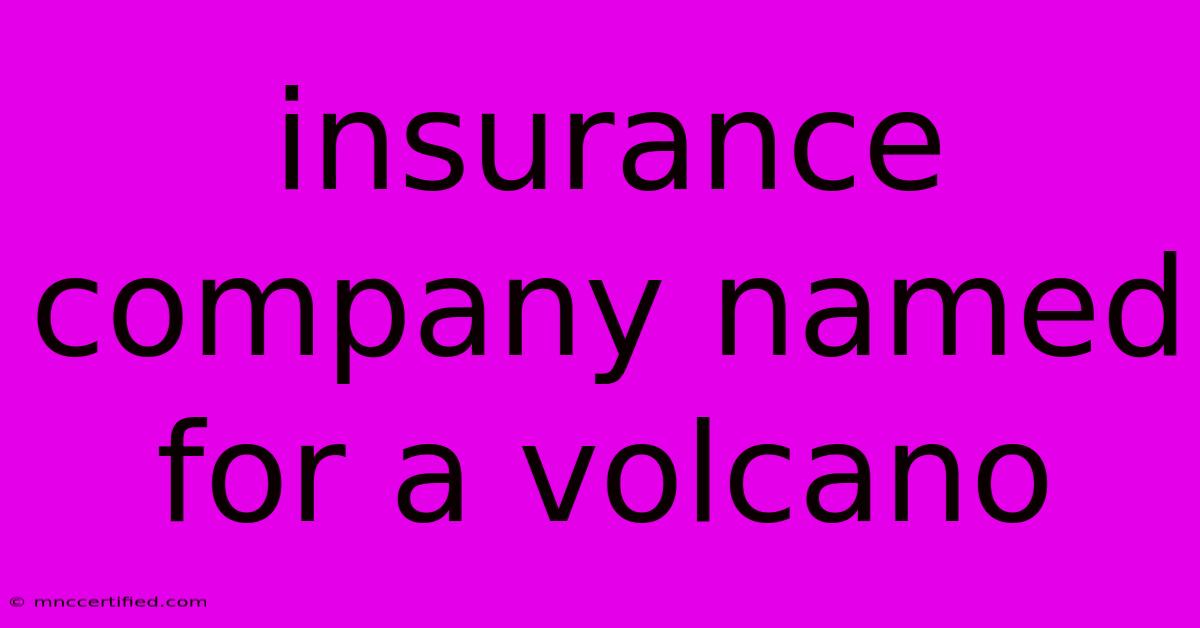Insurance Company Named For A Volcano

Table of Contents
Volcano Insurance: A Fiery Name with a Heart of Gold
Have you ever heard of an insurance company named after a volcano? It might sound unusual, but it's a reality for many, especially those residing near volcanic regions. These insurance companies often offer unique benefits and services tailored to the specific needs of their communities. Today, we'll explore the world of volcano-named insurance companies, diving into their history, offerings, and the reasons behind their fiery appellations.
The Allure of the Volcano: A Symbol of Strength and Resilience
Volcanoes, despite their destructive potential, are often seen as symbols of strength and resilience. Their eruptions, though catastrophic, ultimately lead to the creation of fertile land and breathtaking landscapes. This duality of power and renewal resonates deeply with the nature of insurance.
Insurance companies, like volcanoes, stand as a bastion against unforeseen events. They provide security and peace of mind, helping individuals and businesses recover from the ashes of life's challenges. It's no surprise that companies would adopt names like Mount Vesuvius Insurance, Kilauea Protection, or Etna Financial, harnessing the volcano's symbolic power to convey a sense of security and stability.
Catering to Specific Needs: Volcano-Focused Insurance Offerings
Insurance companies named after volcanoes often offer specialized products and services to address the unique risks faced by communities living near volcanic regions. These can include:
- Volcanic Eruption Insurance: Covering damage to property and possessions caused by volcanic eruptions, including ashfall, lava flows, and seismic activity.
- Evacuation Coverage: Supporting the evacuation of residents and businesses during volcanic emergencies, providing temporary accommodation and transportation costs.
- Business Interruption Insurance: Protecting businesses from financial losses due to disruptions caused by volcanic events, such as temporary closures or supply chain interruptions.
Beyond these specific offerings, these companies might also provide comprehensive insurance packages tailored to the region's specific needs, including:
- Natural Disaster Coverage: Covering damage caused by other natural hazards like earthquakes, tsunamis, and landslides, which often accompany volcanic activity.
- Agricultural Insurance: Protecting farmers from crop losses due to ashfall or other volcanic-related disruptions.
The Importance of Local Knowledge and Expertise
One of the most significant advantages of volcano-named insurance companies is their deep understanding of the local landscape, hazards, and community needs. They often employ experts with extensive knowledge of volcanology and local disaster management strategies, allowing them to provide informed and tailored solutions.
Moreover, these companies often have established relationships with local communities, fostering trust and transparency, especially important during times of crisis.
Looking Beyond the Name: Evaluating Insurance Offerings
While the name of an insurance company can evoke strong emotions and associations, it's crucial to look beyond the name and focus on the actual services and coverage provided. When choosing an insurance provider, remember to:
- Compare quotes: Don't settle for the first offer. Get quotes from multiple providers to find the best value for your needs.
- Review coverage: Carefully read the policy details and ensure the coverage aligns with your specific risks and requirements.
- Check customer reviews: Research the company's reputation and read online reviews from previous clients to gauge their overall satisfaction.
Choosing the right insurance provider is a crucial decision, regardless of the name. While volcano-named companies might offer specialized offerings and local expertise, it's essential to conduct thorough research and make an informed choice based on your unique needs and circumstances.

Thank you for visiting our website wich cover about Insurance Company Named For A Volcano. We hope the information provided has been useful to you. Feel free to contact us if you have any questions or need further assistance. See you next time and dont miss to bookmark.
Featured Posts
-
Watch Michigan Vs Indiana Live Nov 9th
Nov 10, 2024
-
La Liga 2024 Real Madrid And Osasuna Lineups
Nov 10, 2024
-
Kidney Ultrasound Cost With Insurance
Nov 10, 2024
-
Health Insurance Brokers San Diego Ca
Nov 10, 2024
-
Elective Surgery Covered By Insurance
Nov 10, 2024